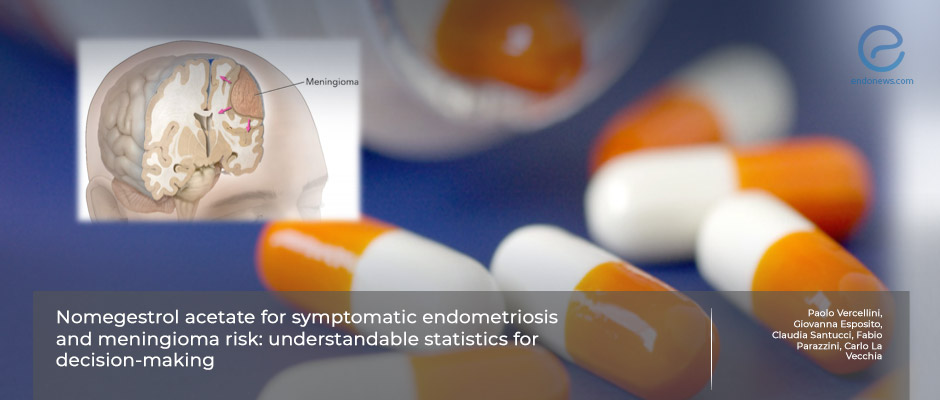Meningioma risk in women with endometriosis using Nomegestrol acetate
Jun 27, 2023
Oral contraceptives are effective in endometriosis patients in terms of pelvic pain, quality of life and sexual function although it might slightly increase the risk of meningioma.
Key Points
Highlights:
- The most important variable predicting the risk of meningioma in women with endometriosis managed with nomegestrol acetate is age depending on the age-period analysis.
Importance:
- Women with endometriosis should be counseled that a slightly increased risk of meningioma during nomegestrol acetate treatment is associated with age and duration of treatment.
What’s done here?
- This paper evaluates the risk of meningioma in women with endometriosis using nomegestrol acetate-containing oral contraceptives.
- The authors aimed to provide simple and absolute information that physicians can use during counseling and women can easily understand.
- They divided into 3-year age groups and 3-year duration of use and estimated the number needed-to-harm (NNH) for each age category.
- They also compared cumulative risk in exposed women per 100,000 persons and attributable cumulative risk increase per 100,000 persons with the incidence rate of meningioma in the general population.
Key results:
- Considering the effect of nomegestrol acetate use on the risk of meningioma, the risk increase is limited in women aged 20–34 years, even after long periods of use.
- Because age is the most important risk factor, the duration of use varies in order not to increase the risk of meningioma in different age groups.
- A maximum of 5 years of 17β estradiol-nomegestrol acetate combination use in women aged 35–44 and 2.5 years of use in women aged 45–54 years might be considered reasonable thresholds.
Lay Summary
Women with endometriosis mostly suffer from symptoms such as chronic pelvic pain, dysmenorrhea, dyspareunia, and infertility. Early diagnosis and management have importance as endometriosis impairs the quality of life and creates a serious social and economic burden. There are different medical treatment options including only progestogens, oral contraceptives, or gonadotropin-releasing agonists/antagonists.
Combined oral contraceptives are a good modality if women request contraception or progestogen monotherapy is associated with breakthrough bleeding or bone mineral density reduction. The standard progestogen in oral contraceptives is oral dienogest for the treatment of endometriosis. However, nomegestrol acetate is another alternative progestogen with a similar healing effect to dienogest in terms of pain, quality of life and sexual function. It also poses a comparable risk of thromboembolism to oral contraceptives containing levonorgestrel.
Vercellini et al. from Italy published a short communication entitled “Nomegestrol acetate for symptomatic endometriosis and meningioma risk: understandable statistics for decision-making” in the European Journal of Obstetrics & Gynecology and Reproductive Biology. They evaluated whether oral contraceptives containing NOMA increase the risk of meningioma which is the most common cerebral tumor with female predominance. The researchers assessed the endometriosis patients in 3-year age groups from 20-34 to 45–54 years and 3-year duration of use from 2.5 years to 6.5 years of use and estimated the number needed-to-harm (NNH)for each age category and duration of use. Because age is the most important risk factor, the duration of use varies in order not to increase the risk of meningioma in different age groups. A maximum of 5 years of 17β estradiol-nomegestrol acetate combination use in women aged 35–44 and 2.5 years of use in women aged 45–54 years might be considered reasonable thresholds.
“These estimates can be used to inform patient choices regarding the treatment of endometriosis with 17β estradiol-nomegestrol acetate containing combined oral contraceptives,” they added.
Research Source: https://pubmed.ncbi.nlm.nih.gov/37183159/
endometriosis meningioma combined oral contarceptives nomegestrol acetate

